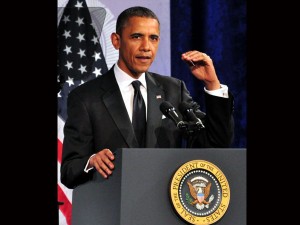MANILA, Philippines – US President Barack Obama recently cited the achievements of the more than 17.3 million Asian-Americans in all facets of American life, including 3.2 million Filipinos “whose talents and contributions strengthen our economy, protect our security and enliven our country every day.”
A report posted on the website of the US Embassy in Manila quoted Obama as praising the “wide-ranging group (of Asian-Americans) that includes athletes and public servants, entrepreneurs and artists and also proud members of the US Armed Forces.”
“From our earliest days, intrepid men and women from the Asia-Pacific region have forged enduring links between America and other nations as they moved across the Pacific,” the US leader said in an April 29 statement on the observance this May of Asian-American and Pacific Islander Heritage Month.
Obama called on all Americans to “visit www.AsianPacificHeritage.gov to learn more about the history of Asian-Americans and Pacific Islanders and to observe this month with appropriate programs and activities.”
“Throughout the US, Asian-American and Pacific Islander Heritage Month is celebrated with community festivals, traditional food, parades and cultural performances. Many schools and government offices hold educational and cultural events,” the report said.
Recognition
The US Congress officially recognized the contributions of Asian-Americans in 1978 by passing a joint resolution establishing Asian-Pacific American Heritage Week. In 1992, Congress made it official by passing a law that designated May as Asian and Pacific American Heritage Month.
According to the embassy report, “the Library of Congress states that the month of May was chosen because the first Japanese immigrants arrived in the US on May 7, 1843.”
“May also marks the anniversary of the completion of the transcontinental railroad in 1869. The majority of the workers who laid the tracks were Chinese immigrants.”
Citing US Census Bureau records, the report said that at 3.8 million, “Chinese-Americans were the largest Asian group, followed by Filipinos (3.2 million), Indians (2.8 million), Vietnamese (1.7 million), Koreans (1.6 million) and Japanese (1.3 million).”
Of the 17.3 million US residents of Asian descent, “14.7 million were considered Asians alone while another 2.6 million were Asians in combination with one or more additional races.”
The report noted that “Asians are the third-largest minority group and the second-fastest growing group in the US.”
The Census Bureau has projected a 161-percent increase in the Asian-American population between 2008 and 2050.
“This compares with a 44-percent increase in the US population as a whole over the same period,” it said.
According to the report, $68,780 was the “median household income for single-race Asians in 2009.”
More data
Other Asian-Americans-related data:
In 2010, the largest population of Asian-Americans was found in California, with 5.6 million, followed by New York (1.6 million) and Texas (1.4 million).
The poverty rate for single-race Asians in 2008 and 2009 was 12.5 percent. On the other hand, the rate increase for non-Hispanic whites was 8.6 percent to 9.4 percent; for blacks, 24.7 percent to 25.8 percent; and for Hispanics, 23.2 percent to 25.3 percent.
“Tagalog, Vietnamese and Korean were each spoken at home by more than one million people,” the report said.
Eighty percent of Asians lived in a household with Internet use, “the highest rate among race and ethnic groups” in the entire United States, the report said.


